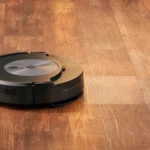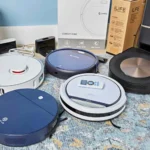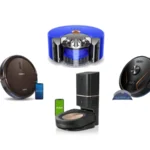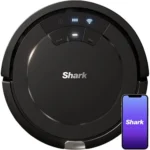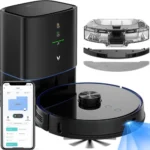Introduction
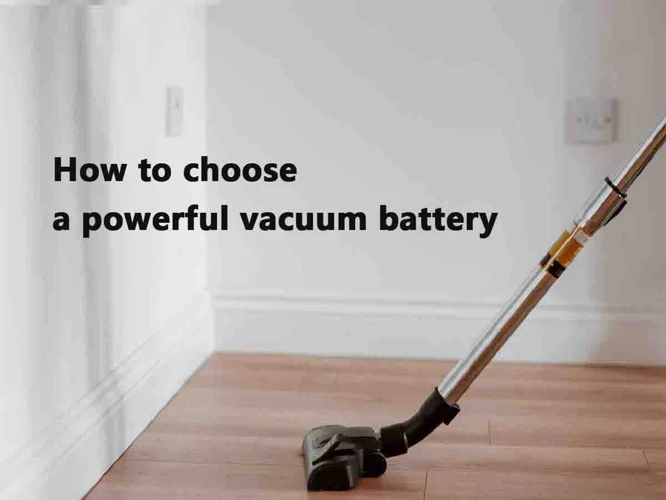
When it comes to choosing the right smart vacuum cleaner, battery life is a critical factor to consider. The last thing you want is to have your vacuum run out of juice in the middle of cleaning your house. But with so many options on the market, how can you know which battery life is right for you? In this article, we’ll discuss the various factors to consider when selecting the battery life of a smart vacuum cleaner, as well as the benefits and disadvantages of longer and shorter battery lives. Plus, we’ll share some tips on how to maintain your battery’s lifespan. Let’s dive in!
What is a Smart Vacuum Cleaner?
A smart vacuum cleaner is a robotic vacuum that uses intelligent programming and sensors to navigate around your home and clean your floors without any human interference. These devices have gained popularity and become a common household item due to their convenience and ease of use. They are designed to save time and effort by automatically cleaning floors of dust, debris, and pet hair.
Smart vacuum cleaners come in different sizes and designs to accommodate various floor types and cleaning needs. They can be programmed to clean at specific times and can be controlled through a mobile app or voice commands via a smart speaker. These devices typically come with a charging dock where they return when low on battery.
One of the core features of a smart vacuum cleaner is its intelligence. Many models have sensors that enable them to avoid obstacles and navigate around your home, and they are equipped with advanced mapping technologies that allow them to remember the layout of your home. Some models adjust their suction power depending on the type of surface they are cleaning, which can be helpful for maintaining the life of your carpets and hard floors.
When it comes to selecting a smart vacuum cleaner, there are several factors to consider to ensure you get the right device for your needs. Understanding the features and capabilities of the devices can help you make an informed decision. You might want to consider factors such as the suction power, mapping technologies, dustbin capacity, pet hair cleaning capabilities, the noise level, smart sensors, and smart home factors.
In the next sections of this article, we will discuss the importance of battery life, the factors to consider when selecting the battery life of a smart vacuum cleaner, and how to maintain your battery life, among other things. So, keep on reading to learn more.
Why Battery Life Matters?
The battery life of a smart vacuum cleaner is crucial to its performance and operation. The length of time a vacuum cleaner can run depends on its battery capacity, type of battery, and charging time. Thus, it is imperative to understand why the battery life of a smart vacuum cleaner matters before making a purchasing decision.
Why does battery life matter?
| Reasons | Importance |
|———————————————————————-|—————————————————————————————————————————————————————————————————————————————————————————————————————————————————————————————————————————————————————————————————————————————————————————————————————————————————————————————-|
| Efficiency | Smart vacuum cleaners with longer battery life can clean larger areas without needing frequent charging. This translates to fewer interruptions and more time for other household chores.
If a smart vacuum cleaner runs out of battery quickly, it might need to recharge while cleaning, which could considerably increase the overall cleaning time.
Longer battery life equates to greater overall efficiency. |
| Convenience | Smart vacuum cleaners with a longer battery life require less frequent charging, thus providing increased flexibility and convenience. You can set the device to clean when you’re absent or set a particular time for cleaning such that it can charge beforehand.
Additionally, if you don’t have a lot of time or don’t want to monitor the cleaning process constantly, getting a device with extended battery life is essential. |
| Suitable for larger households | In larger households or apartments, a smart vacuum cleaner with longer battery life is critical. These devices can clean a sizable surface area without needing to recharge. That way, you can clean more rooms at once or clean a larger area without worrying about the battery draining prematurely. |
| Weight | Longer battery life can result in the device being slightly heavier than with a shorter battery life. However, this weight increase should not be significant enough to cause discomfort or pain in the user’s wrists or back. |
| Long-term cost savings | Smart vacuum cleaners with longer battery life are generally more expensive. However, in the long run, this purchase can save you money as you’ll spend less on battery replacements, maintenance, and upgrades, in turn ensuring your device lasts longer. |
| Overall performance | Battery life influences the overall performance of smart vacuums. A long battery life can result in the device cleaning more efficiently, with better suction power and no need to recharge as frequently. This ensures optimal cleaning results, in turn making your home cleaner and tidier.
When considering a smart vacuum cleaner, it is crucial to keep battery life in mind for the best results. |
A longer battery life is beneficial for smart vacuum cleaners, allowing them to operate more efficiently, conveniently, and effectively in larger households, at minimal long-term costs. When purchasing a smart vacuum cleaner, it is crucial to factor in battery life alongside other essential features such as suction power, dustbin capacity, mapping technology, smart sensors, HEPA filters, noise level, and smart home compatibility.
Factors to Consider
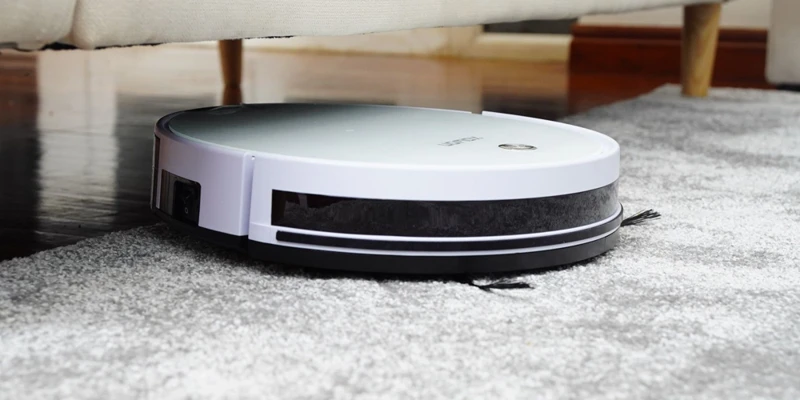
When selecting a smart vacuum cleaner, there are several factors to consider that can impact the overall cleaning experience. From the type of battery to the charging time, each element can affect how efficient and effective the smart vacuum operates. It is important to carefully evaluate each of these factors to ensure that you choose a smart vacuum that meets your specific needs. Additionally, understanding these factors can help you make an informed decision when comparing different brands and models on the market. To learn more about the key factors to consider when selecting a smart vacuum cleaner, continue reading this guide. And for more information on other important features to consider when choosing a smart vacuum, check out our ultimate smart vacuum cleaner guide.
Type of Battery
The type of battery that a smart vacuum cleaner uses is an important factor to consider when selecting one to purchase. There are typically two types of batteries used in smart vacuums: lithium-ion and nickel-metal hydride (NiMH).
Lithium-ion batteries are becoming increasingly common in smart vacuums. They are lighter and more efficient than NiMH batteries, which means they can provide longer run times and faster charging times. They are also less prone to losing their charge over time, which can be a concern with NiMH batteries. Another benefit is they don’t suffer from the “memory effect” that NiMH batteries can suffer from. This is where the battery “remembers” how much charge it regularly takes and can eventually lead to the battery losing capacity.
NiMH batteries are generally cheaper than lithium-ion batteries, but they are also heavier and bulkier. They may provide a shorter run time than lithium-ion batteries, and may also take longer to charge. NiMH batteries also tend to lose their charge over time, so they may not be the best choice for those who need to use their smart vacuum infrequently.
It’s important to consider the type of battery a smart vacuum cleaner uses when making a purchase decision. Lithium-ion batteries may be a better choice for those who want faster charging times, longer run times, and more consistent performance. NiMH batteries may be a good choice for those who are on a budget and don’t need the advanced features that lithium-ion batteries offer.
If you want to learn more about other factors to consider when selecting a smart vacuum cleaner, check out our article on dustbin capacity, smart sensors, or noise levels.
Battery Capacity
When it comes to choosing the right smart vacuum cleaner, battery capacity is an essential factor to consider. Battery capacity refers to the amount of energy that a battery can store and provide to the motor, which powers the vacuum’s suction. The higher the battery capacity, the longer the vacuum can run on a single charge.
Factors Influencing the Battery Capacity of Smart Vacuum Cleaners:
To help you understand the importance of battery capacity, here are some key factors to consider when comparing battery capacities among different smart vacuum cleaners.
| Factor | How It Affects Battery Capacity |
|---|---|
| Battery Type | Different battery types have different capacities. For example, lithium-ion batteries tend to have a higher capacity than nickel-cadmium batteries. |
| Suction Power | The higher the suction power, the more energy the motor consumes, which reduces the battery life. For more information on this topic, check out our article on choosing the right suction power for your smart vacuum cleaner. |
| Brushroll | Smart vacuums with brushrolls require more energy to operate, which impacts the overall battery life. Check out our article on mapping technology in smart vacuums to learn more about brushroll technology. |
| Cleaning Mode | Some smart vacuum cleaners, such as those designed for pet owners (check out our guide on this topic), offer different cleaning modes. Some modes use more suction power and battery life than others. |
| Additional Features | Some smart vacuums come with additional features, such as HEPA filters that need to be powered, which can affect battery life. |
How to Determine the Right Battery Capacity:
When selecting a smart vacuum cleaner, consider your cleaning needs and the size of your home. If you have a large home, you may need a smart vacuum with a larger battery capacity to ensure that it can clean your entire home in one charge. If you have a smaller home or apartment, a smaller battery capacity may be sufficient.
Additionally, take note of the battery life in the manufacturer’s specifications. A high-capacity battery will typically last longer but may take longer to charge. Conversely, a lower-capacity battery may charge more quickly but may not last as long.
Finally, it’s always a good idea to read reviews and ratings from other users to get a sense of how long the battery lasts in real-world scenarios.
Battery capacity is an important factor to consider when selecting a smart vacuum cleaner. By understanding the factors that influence battery capacity and your own cleaning needs, you can make an informed decision and find a smart vacuum that meets your needs.
Charging Time
When it comes to the battery life of a smart vacuum cleaner, the charging time is an important factor to consider. The charging time refers to the amount of time it takes for the vacuum cleaner’s battery to fully charge from zero to one hundred percent. A shorter charging time can be beneficial if you need to use your vacuum cleaner frequently, while a longer charging time may be more manageable if you don’t need to use it as often.
Factors that Affect Charging Time:
- Battery Capacity: Vacuum cleaners with a larger battery capacity will typically take longer to fully charge than those with a smaller capacity. This is because there is more energy that needs to be stored in the battery.
- Charger Output: The charger output is the amount of power that the charger can provide to the vacuum cleaner’s battery. A charger with a higher output will generally charge the battery faster than one with a lower output.
- Charging Method: Some smart vacuum cleaners come with specialized charging stations that are designed to charge the battery more effectively. These charging stations may use advanced technologies such as quick charging or trickle charging to help speed up the charging process.
When choosing a smart vacuum cleaner, it’s important to consider the charging time and how it will fit into your cleaning routine. If you need to use your vacuum cleaner frequently and don’t want to wait for it to charge, look for one with a shorter charging time. If a longer charging time is more manageable for you, then you can focus on other factors such as battery lifespan and capacity.
It’s also important to note that a longer charging time does not necessarily mean that the battery is of poor quality. In fact, some high-quality batteries may take longer to charge in order to maintain their lifespan and ensure that they are not overcharged.
To learn more about other important factors to consider when selecting a smart vacuum cleaner for your smart home, check out our article on Smart Vacuum Cleaners and Factors to Consider for Your Smart Home.
Battery Lifespan
When selecting a smart vacuum cleaner, battery lifespan is an important factor to consider alongside battery capacity and charging time. A battery’s lifespan determines how long the battery will continue to operate efficiently before needing a replacement.
Typically, lithium-ion batteries are the most common in smart vacuum cleaners due to their longer lifespan and better performance compared to other types of batteries. On average, a lithium-ion battery can last between 2 and 3 years.
However, the lifespan of a battery can be affected by how often the cleaner is used, the type of cleaning surface, temperature, and other factors. To make it easier to understand the lifespan of different smart vacuum cleaner batteries, check out the table below:
| Battery Type | Average Lifespan |
|---|---|
| Lithium-ion | 2-3 years |
| Nickel-metal hydride (NiMH) | 1-2 years |
| Nickel-cadmium (NiCad) | 1-2 years |
It’s important to note that a battery’s lifespan doesn’t necessarily equate to its overall performance. A lithium-ion battery with a shorter lifespan may still perform better than a NiMH battery with a longer lifespan. However, a shorter lifespan may indicate that the battery will need to be replaced more frequently, which can be an additional expense.
To maximize the longevity of a smart vacuum cleaner’s battery, it’s essential to maintain it properly. Regular cleaning and storage, avoiding extreme temperatures, and proper usage can all help extend the lifespan of the battery.
How to Choose
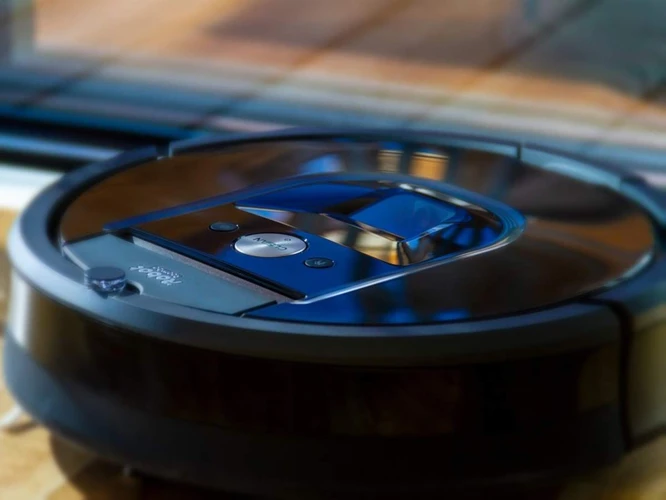
When it comes to selecting the battery life of your smart vacuum cleaner, considering your options can be a daunting task. With so many brands and models available in the market, it can be overwhelming to make the right choice. However, by following a few simple steps, you can select a battery life that suits your cleaning needs. Let’s take a closer look at how to choose the right battery life for your smart vacuum cleaner.
Consider Your Cleaning Needs
When choosing the battery life of a smart vacuum cleaner, it’s important to consider your cleaning needs. There are several factors that can impact your decision, including the size of your home, the frequency of cleaning, and the type of flooring.
Size of your home: If you have a larger home, you may need a vacuum with a longer battery life in order to clean all the different rooms. Alternatively, if you have a smaller space, you may not need a vacuum with a longer battery life as you will be able to clean your space quickly.
Frequency of cleaning: Consider how often you will need to use your smart vacuum cleaner. If you plan on using it daily, a longer battery life may be necessary. However, if you only plan on using it occasionally, a shorter battery life may be sufficient.
Type of flooring: The type of flooring in your home may also impact your battery life needs. For example, if you have hardwood floors or low-pile carpet, you may be able to get away with a shorter battery life. But if you have thicker carpets or rugs, you may need a vacuum with a longer battery life to ensure a thorough clean.
To help you determine the best battery life for your needs, refer to the table below:
| Cleaning Needs | Best Battery Life |
|---|---|
| Large home with multiple rooms | 60+ minutes |
| Small home or apartment | 30-45 minutes |
| Daily cleaning | 60+ minutes |
| Occasional cleaning | 30-45 minutes |
| Hardwood floors or low-pile carpet | 30-45 minutes |
| Thicker carpet or rugs | 60+ minutes |
Consider these factors when selecting the battery life of your smart vacuum cleaner to ensure that you choose a model that will meet your needs and provide the best cleaning experience.
Compare Brands and Models
When selecting a smart vacuum cleaner with a long-lasting battery life, it is essential to compare different brands and models to determine which one best meets your needs. A wide range of features and capabilities are available across various manufacturers, making the research and comparison process critical for a user looking to purchase the best product. Here are some factors to keep in mind:
1. Brand Reputation: Different vacuum cleaner brands have different reputations for quality and durability. Look for brands that have established themselves as trusted leaders in the industry, with strong customer reviews and ratings.
2. Battery Type: Some vacuum cleaners use lithium-ion batteries, while others use nickel-metal hybrid batteries. Lithium-ion batteries have a longer lifespan and shorter charging time than nickel-metal hybrid batteries, but they can be more expensive. Consider which battery type is best for your budget and the amount of cleaning you need to do.
3. Battery Capacity: Battery capacity refers to the amount of energy a battery can store. A higher capacity battery will last longer between charges. Look for vacuum cleaners with a battery capacity of at least 2000mAh.
4. Charging Time: The charging time required for a vacuum cleaner battery to fully charge varies between models. The charging time should not be too long, as it can interrupt your cleaning tasks.
5. Features: Look for a good balance between features and battery life. Some vacuum cleaners may have more features, such as multiple cleaning modes and automatic docking and recharging. However, these features may drain the battery faster.
Here is a comparison table of popular smart vacuum cleaner models and their battery life details:
| Brand and Model | Battery Type | Battery Capacity | Charging Time | Battery Life |
|---|---|---|---|---|
| iRobot Roomba 960 | Lithium-ion | 3300mAh | 2.5 Hours | 75 Minutes |
| Eufy RoboVac 11S MAX | Lithium-ion | 2600mAh | 5 Hours | 100 Minutes |
| Shark ION Robot 750 | Lithium-ion | 2600mAh | 3 Hours | 60 Minutes |
| iLife V3s Pro | Lithium-ion | 2600mAh | 5 Hours | 120 Minutes |
| Xiaomi Mi Robot Vacuum-Mop | Lithium-ion | 3200mAh | 5 Hours | 150 Minutes |
By comparing the battery life details of various models, you can identify which brands and models have the features and battery life that best fit your cleaning needs.
Read Reviews and Ratings
When selecting a smart vacuum cleaner, it’s important to read reviews and ratings from other users who have already purchased and tested the product. This can give you valuable insight into the pros and cons of each vacuum cleaner model and brand, helping you make a more informed decision.
Here are some tips on how to read reviews and ratings:
- Look for reviews with a high number of stars. These reviews are generally from satisfied customers who have had a positive experience with the product.
- Pay attention to common themes in reviews – if many people are complaining about the same issue, it’s likely that it’s a legitimate concern.
- Don’t be swayed by one or two negative reviews. Some people may have had a bad experience, but it’s important to look at the overall consensus.
- Consider the context of the reviews. For example, if a vacuum cleaner has a high rating but all the reviews are from people with small apartments, it may not be suitable for larger homes.
A good place to find reviews and ratings is online shopping websites such as Amazon, Best Buy, or Walmart. These websites have a large number of reviews from verified buyers that can help you evaluate which vacuum cleaner is the best fit for your needs.
Remember to take the time to read reviews carefully, as they can provide valuable information that may not be evident from just looking at the specifications of a vacuum cleaner. By doing so, you will be able to make a more informed decision that will ultimately result in a more satisfying purchase.
Benefits of a Longer Battery Life
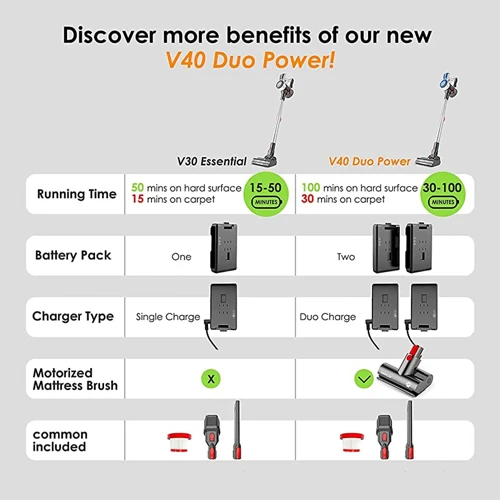
When it comes to selecting a smart vacuum cleaner, having a longer battery life can have many benefits. Not only can it increase efficiency, but it can also make cleaning more convenient. Additionally, a longer battery life means less interruptions and a more efficient cleaning experience. In this section, we’ll take a closer look at the advantages of a longer battery life for your smart vacuum cleaner.
Increased Efficiency
One of the major benefits of a longer battery life for a smart vacuum cleaner is the increased efficiency it provides. This means that the vacuum cleaner can clean for longer periods without interruptions and cover more ground in less time. Let’s take a closer look at the specific ways in which a longer battery life can increase efficiency:
| Increased Cleaning Area | Reduced Charging Time |
|---|---|
| With a longer battery life, the smart vacuum cleaner can cover a larger cleaning area without needing to stop and recharge in the middle of the cleaning session. This means that you can clean more space in one go, and it’s especially useful if you have a larger house or if you prefer to clean the entire house in one go. | A shorter charging time also increases efficiency by allowing you to use the vacuum cleaner more frequently. With a shorter charging time, you can quickly recharge the vacuum between cleaning sessions, ensuring it’s ready to go whenever you need it. |
| Better cleaning quality | Lower maintenance |
| When the battery runs low, the suction power of the smart vacuum cleaner will decrease. This means that a longer battery life can result in better cleaning quality as the vacuum cleaner will maintain consistent suction throughout the cleaning session. This is especially important if you have pets or need to clean high-traffic areas regularly. | Another benefit of a longer battery life is the reduced maintenance cost. When the battery life is short, you need to replace it more often, which can be costly. With a longer battery life, you can go for longer periods without needing to replace the battery, which can save you money and time. |
These benefits of increased efficiency can be especially helpful for those who need to keep their homes clean but don’t have a lot of spare time. By investing in a smart vacuum cleaner with a longer battery life, you can save time and effort while keeping your home clean and tidy.
More Convenient Cleaning
With a longer battery life, using a smart vacuum cleaner becomes a more convenient and hassle-free cleaning experience. Here are some ways in which a longer battery life can lead to more convenient cleaning:
- Extended cleaning sessions: A smart vacuum cleaner with a longer battery life allows for longer cleaning sessions. This means that you can clean your entire house or apartment in one go, without having to recharge the battery in the middle of the process. This saves time and effort while ensuring that your house is thoroughly cleaned.
- Flexibility: A longer battery life gives you more flexibility in terms of when and where you can clean. With a short battery life, you may have to plan your cleaning sessions around the charging process. However, with a longer battery life, you can clean whenever you want, without worrying about interruptions due to low battery levels.
- No cords: A smart vacuum cleaner with a longer battery life eliminates the need for cords and wires. This means that you can move around your house easily without worrying about unplugging and plugging in the device. A cordless vacuum cleaner lets you reach all the hard-to-reach spaces without tangling up cords or getting stuck in corners.
A longer battery life provides more convenience, flexibility, and freedom when it comes to cleaning your home. It eliminates the need for frequent charging, allows for longer cleaning sessions, and gives you the ability to clean without worrying about cords or wires. But remember, a longer battery life is not the only factor to be considered when selecting a smart vacuum cleaner. Make sure to assess your cleaning needs and compare brands and models before making a purchase.
Disadvantages of a Shorter Battery Life
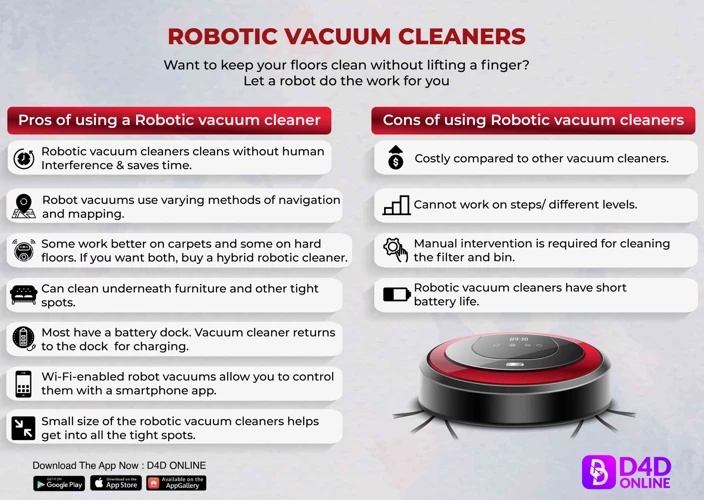
One of the major downsides of a smart vacuum cleaner with a shorter battery lifespan is that it can hinder your cleaning routine. It can be frustrating to have to interrupt the cleaning process midway to recharge the battery or to have to wait for the battery to charge before resuming cleaning. The inconvenience caused by a shorter battery life can affect the efficiency and effectiveness of your vacuum cleaner, leaving you feeling perplexed about the choice you made. Let’s explore some of the disadvantages of a shorter battery life and how it can affect your cleaning routine.
Less Cleaning Time
A shorter battery life for your smart vacuum cleaner has several disadvantages, one of which is less cleaning time. This could be a major concern for those with bigger homes or more carpeted floors. If you have a smaller battery, you will have to stop your cleaning process multiple times to recharge, which will not only eat up your time but also decrease your efficiency. Some more disadvantages of a shorter battery life are:
- Increased frequency of charging
- Messy and incomplete cleaning sessions
- Less flexibility in cleaning schedule
- Noisy vacuuming due to frequent charging
Having to recharge the vacuum more often than desired could lead to more inconvenience, and in busy households, cleaning downtime may be limited. Frequent interruptions can disrupt your cleaning process and even affect the efficiency and effectiveness of your vacuum’s cleaning job. It can be frustrating to have to wait for your vacuum cleaner to recharge multiple times during a cleaning session.
To avoid these downside consequences, it is essential to consider the battery life of your smart vacuum cleaner when selecting a device. The right battery capacity is critical when considering the size of your house, pet owners, or people with allergies, and the number of floors that need cleaning.
So, when deciding on a smart vacuum cleaner, be sure to look carefully at the battery life and other factors that can affect the vacuum’s cleaning performance. By doing so, you’ll be able to maximize your vacuum’s potential and minimize cleaning time through uninterrupted battery life.
More Interruptions
Smart vacuum cleaners with shorter battery life can be a major inconvenience as they are likely to interrupt your cleaning process frequently. This can be particularly frustrating if you have a large area to clean or are in the middle of cleaning a particularly dirty area.
Here are some ways in which a shorter battery life can cause more interruptions during your cleaning process:
| Poor performance | When the battery starts to run low, the suction power of the smart vacuum cleaner may decrease. This can lead to poor performance and a less than satisfactory cleaning result. |
| More frequent charging | A shorter battery life means that the smart vacuum cleaner needs to be charged more often. This can be frustrating if you don’t have the time or patience to wait for the battery to fully charge before continuing with your cleaning process. |
| Incomplete cleaning | If the battery dies before the smart vacuum cleaner can finish cleaning a large area, you may need to wait until the battery charges again to resume cleaning. This can be a major interruption and delay in your cleaning process. |
| Difficulty navigating | When the battery starts to run low, the smart vacuum cleaner may have difficulty navigating around obstacles and finding its way back to the charging dock. This can cause it to get stuck or lost, requiring additional effort on your part to manually move the vacuum cleaner back to the charger. |
A shorter battery life can cause a lot of interruptions and frustrations during your cleaning process. It is important to consider the battery life when selecting a smart vacuum cleaner to ensure that it meets your cleaning needs and preferences.
How to Maintain Your Battery Life
Once you’ve invested in a smart vacuum cleaner with a longer battery life, it is essential to take steps to maintain its performance. Battery maintenance is crucial to preventing malfunctions and ensuring long-term efficiency. In this section, we’ll go over some helpful tips on how to maintain your battery life to prolong its lifespan and keep your smart vacuum cleaner running smoothly. By implementing these easy steps, you can enjoy optimal performance out of your vacuum cleaner and maximize its battery life.
Regular Charging
One of the most important ways to maintain your smart vacuum cleaner’s battery life is through regular charging. By charging your vacuum regularly, you ensure that its battery is always fully charged and ready to clean when you need it. Here are some tips for regular charging:
- Charge your vacuum after each use: After each cleaning session, make sure to plug your vacuum in and let it charge. This will ensure that it is fully charged and ready to use the next time you need it.
- Don’t overcharge: Overcharging can be harmful to your vacuum’s battery and can shorten its overall lifespan. Make sure to unplug your vacuum once it is fully charged.
- Use the correct charger: Always use the charger that came with your vacuum to prevent damage to your vacuum’s battery.
- Avoid charging in extreme temperatures: Charging your vacuum in extreme temperatures, such as very cold or very hot environments, can damage the battery. Charge your vacuum in a temperature-controlled environment for optimal charging.
By following these regular charging tips, you can help ensure that your smart vacuum cleaner’s battery life remains at its best.
Proper Storage
Proper storage is another key factor in maintaining the longevity of your smart vacuum cleaner’s battery life. When not in use, it’s important to store the device in a way that will protect it from damage and ensure the battery stays in good condition.
Here are some tips for proper storage of your smart vacuum cleaner:
| Avoid extreme temperatures: | Do not store your smart vacuum cleaner in areas with excessively hot or cold temperatures. Extreme temperatures can damage the battery and shorten its lifespan. |
| Keep it dry: | Make sure the vacuum cleaner is completely dry before storing it. Moisture can cause damage to the battery and other internal components. |
| Store in a safe place: | Store your smart vacuum cleaner in a safe and secure location. This will prevent any damage or accidents that could occur if it falls or is knocked over. |
| Avoid direct sunlight: | Direct sunlight can cause damage to the battery and other internal components. Store your vacuum cleaner in a shaded area. |
| Disconnect the battery: | If you’re storing your smart vacuum cleaner for an extended period, it’s a good idea to disconnect the battery. This can help prevent the battery from draining completely and becoming damaged while in storage. |
By following these storage tips, you can help extend the life of your smart vacuum cleaner’s battery and ensure optimal performance when you’re ready to use it again. Remember, proper storage is just one part of maintaining your smart vacuum cleaner’s battery life. Be sure to also follow our tips for regular charging and temperature control.
Temperature Control
One of the less known but still important factors to consider when it comes to maintaining the battery life of your smart vacuum cleaner is temperature control. Extreme temperatures can adversely affect the performance and lifespan of your battery. Here are some tips on how to control the temperature to ensure that your battery lasts long and performs efficiently:
- Avoid exposing the vacuum cleaner to direct sunlight: Prolonged exposure to direct sunlight can cause the battery to overheat and be damaged. Try to store your vacuum cleaner in a shade or a cooler place in your home.
- Avoid using the vacuum cleaner in extreme temperatures: High temperatures can damage the battery and reduce its capacity. Additionally, low temperatures can also slow down the chemical reactions inside the battery which can result in a shorter battery life. Try to use your smart vacuum cleaner in temperatures between 15-25 degrees Celsius.
- Keep the vacuum cleaner in a well-ventilated area: Good ventilation helps in dissipating the heat generated by the battery during charging and usage. This will prevent the battery from overheating and getting damaged.
- Charge the battery in a cool place: When charging the battery, it is important to keep it in a cool place. Avoid charging the battery in direct sunlight or near a source of warmth like a stove or a radiator. This will help prevent the battery from getting damaged due to overheating.
Proper temperature control will help to extend the lifespan of your smart vacuum cleaner’s battery and ensure that it works efficiently. By keeping your vacuum cleaner away from extreme temperatures, you can avoid reducing its battery capacity and prevent it from getting damaged.
Conclusion
In conclusion, choosing the right battery life for your smart vacuum cleaner is crucial for a hassle-free cleaning experience. With the right battery, you can increase efficiency and enjoy more convenient cleaning, while avoiding the disadvantages of a short battery life like less cleaning time and more interruptions.
To make the right choice, consider factors such as the type of battery, battery capacity, charging time, and battery lifespan. Also, evaluate your cleaning needs and compare brands and models before making a final decision.
Once you have your smart vacuum cleaner, remember that proper maintenance of the battery is essential for optimal performance. Regular charging, proper storage, and temperature control are all simple steps you can take to extend your battery lifespan.
Overall, investing in a smart vacuum cleaner with a longer battery life is a smart choice that will save you time and energy in the long run. So, take the time to do the research and make an informed decision, and enjoy the benefits of a clean home without the hassle.
Frequently Asked Questions
What is the average battery life of a smart vacuum cleaner?
The average battery life of a smart vacuum cleaner ranges from 60 to 120 minutes.
Can you replace the battery of a smart vacuum cleaner?
Yes, most smart vacuum cleaner models allow for battery replacement.
How long does it take for a smart vacuum cleaner to fully charge?
The charging time for a smart vacuum cleaner varies but typically ranges from 2 to 6 hours.
What types of batteries are found in smart vacuum cleaners?
Smart vacuum cleaners can have different types of batteries including lithium-ion, nickel-cadmium, and nickel-metal hydride.
Can using a higher capacity battery increase the cleaning time of a smart vacuum cleaner?
Yes, a higher capacity battery can increase the cleaning time of a smart vacuum cleaner as it would provide more power to the vacuum motor.
How long can a battery last before it needs to be replaced?
The lifespan of a battery depends on various factors such as usage, charging frequency, and battery quality. Generally, batteries last 2-3 years before they need to be replaced.
Can you use a smart vacuum cleaner while it’s charging?
Some models allow for usage while charging, but it is recommended to refer to the manufacturer’s instructions before doing so.
What happens if the battery of the smart vacuum cleaner overheats?
Overheating can damage the battery and reduce its lifespan, affecting the performance of the vacuum cleaner. It is crucial to avoid exposing the battery to extreme temperatures.
Do smart vacuum cleaners consume less energy when the battery life is low?
No, energy consumption remains the same regardless of the battery charge level.
Can a smart vacuum cleaner with a shorter battery life still perform effectively?
Yes, a smart vacuum cleaner with a shorter battery life can still perform effectively; it just needs more frequent charging and may take more time to complete the cleaning job.

